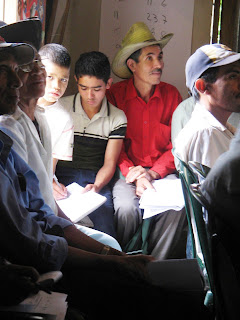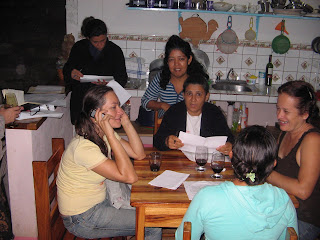 We spent a lot of time in the last month or so getting to know people and exploring the Jalapa Valley. In order to better understand the lives of Jalapeños, Dan worked with people in their daily jobs- repairing busses with our host family, harvesting beans, etc. Dan spent a day with Alejandro Aguirre (from ACADIS) checking on a solar-panel project for communities without electricity. Dan continues to study Spanish as much as possible with Javier, and he and two other friends now work together in a conversational Spanish/English exchange. On 11/15, CCAJ (Cooperative of Active Campesinos of Jalapa) invited us to observe their annual election and report. We were honored and excited to participate.
We spent a lot of time in the last month or so getting to know people and exploring the Jalapa Valley. In order to better understand the lives of Jalapeños, Dan worked with people in their daily jobs- repairing busses with our host family, harvesting beans, etc. Dan spent a day with Alejandro Aguirre (from ACADIS) checking on a solar-panel project for communities without electricity. Dan continues to study Spanish as much as possible with Javier, and he and two other friends now work together in a conversational Spanish/English exchange. On 11/15, CCAJ (Cooperative of Active Campesinos of Jalapa) invited us to observe their annual election and report. We were honored and excited to participate.Karla’s work in the Huertos program is moving along well. She delivered seeds this month and Huertos are growing again, after waiting out the rainy season. She also led a successful vermiculture workshop in Santa Martha (former FCP Huertos beneficiaries donated the worms
 for this community). Unfortunately, the people in Santa Rosa are somewhat dis-animated at the moment, but Karla noted that after about 9 months in Pasmata, people lost interest after a harvest. She says this is common but surmountable with care and attention; she plans to visit Santa Rosa 2x/week until people get back into it. As we decided to pause program expansion, she has more time to do this than she would have otherwise. Impressively, upon our request to conserve funding, she cut the cost of each workshop in ½, asking communities provide some of the refreshments- things like bananas, oranges, and other fruits and vegetables. People were very understanding, happy and proud to contribute.
for this community). Unfortunately, the people in Santa Rosa are somewhat dis-animated at the moment, but Karla noted that after about 9 months in Pasmata, people lost interest after a harvest. She says this is common but surmountable with care and attention; she plans to visit Santa Rosa 2x/week until people get back into it. As we decided to pause program expansion, she has more time to do this than she would have otherwise. Impressively, upon our request to conserve funding, she cut the cost of each workshop in ½, asking communities provide some of the refreshments- things like bananas, oranges, and other fruits and vegetables. People were very understanding, happy and proud to contribute.PU currently has very few active members- from the 3 Huertos communities, and a couple of friends from organizations around town. Attendance has been low at recent meetings, and after much discussion, the three reps decided that we need to reinvigorate the group. We hope to do so by bringing in new and old FCP comrades and writing organizational by-laws, to clarify the goals and diversify the representative base. At the 12/5 PU meeting, we asked each PU member to invite members from their community who worked with FCP in the past, and to seek out other people from new communities who may like to work with us. We understand that this process will have to be handled delicately and with a view to the future.
Doña Carmen acted immediately, and on 12/10, we met various folks at her house in Santa Martha- people who worked on FCP’s water projects, who are still active members of the El Corozo Water Board, as well as other leaders from communities near Santa Martha. Incidentally as we walked home, a man pulled over the big cargo truck he was driving, jumped out and asked us, “Ustedes son de Colorado- Are you from Colorado?” We told him we were, and he excitedly told us that Colorado are “his people--” that he worked with Brendan on the water project in Teotecacinte, and to hop in so we could chat along the way. This was wonderfully uncanny, as not an hour before, we were all lamenting that we’d lost touch with FCP’s collaborators in Teotecacinte, and didn’t know where to begin to find them, as this town has grown exponentially since we completed the water project.
Dan is researching grant opportunities for FMJ. At an FMJ meeting on 11/24, all recognized the need to formalize the organization with the government to secure such an opportunity. We need come up with a document of legal statutes for FMJ and send it to Managua for approval. The process could take 6 months or more, but Hannah is working with the women to prepare the document. Each woman is also looking for cheap or rent-free places to set up an office. If we can find such a space, FMJ will have a secure, centralized place to base their activities, counsel women and store confidential documents. While room rentals are not more than $100/month, this is currently impossible for FMJ, as the women are all unpaid volunteers and the organization has zero funding.
 Hannah has also been researching setting up a fair trade market in the States to sell artisanal pine baskets, made by local women. The baskets are beautiful and a learnable craft, as well as inexpensive to make, using mostly locally sourced pine needles that fall from the trees. We plan to hold workshops in the new year to expand this skill to other women, campesina a campesina as a form of income for Jalapeña families.
Hannah has also been researching setting up a fair trade market in the States to sell artisanal pine baskets, made by local women. The baskets are beautiful and a learnable craft, as well as inexpensive to make, using mostly locally sourced pine needles that fall from the trees. We plan to hold workshops in the new year to expand this skill to other women, campesina a campesina as a form of income for Jalapeña families. 









